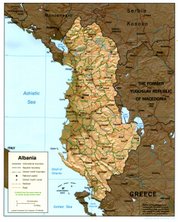
Last evening at the Ministry of Culture there was a presentation of a small, recently published book, entitled "A Shkodra story", which describes the history of the first maritime flags of the Albanian Merchant Marine (1913-14).

The story came about because of the curiosity and research of an Italian Navy Officer, Paul Muner, now 64 years old, and retired, who spent considerable time in Albania since 1992, when he was dispatched to work as a Commander of the Coast Guard. This unit was charged to take control of the wave of speed boats that in those days transported, every night, hundreds of illegal immigrants to the Italian coast. He hales from Trieste, where he also had the opportunity to research old records that were preserved by Austria, covering a period of maritime history along the Balkan Adriatic coast.

Balkan history is rather complex and voluminous to explain, but the subject of this book revolves around the city of Shkodra and its large lake for the following reason.
Among the many changes in the political map of the Balkans (between the late 1800's and early 1900's) there was the decline of the Venetian dominance along the Adriatic, the retreat of the Ottoman empire further south, while Montenegro at one point took over the port of Ulcinj. This port was the base of the Albanian merchant marine, which at that time was still traveling with Turkish flag since Albania was still part of that empire.
Turkey offered to relocate this fleet near the Bosphorus, but the Albanians decided instead to move themselves to the Shkodra area, which currently shares its lake also with Montenegro. Shkodra was at one point considered the capital of the Albanian region. After the recognition in 1912 of Albania as an independent nation, the fleet began to use its own maritime flag using the same colors of the national one (red and black stripes).

After a lovely short musical opening and the customary introductions, the author addressed the audience in Italian with a preface read in Albanian. He covered many details, and explained the difficulties encountered in translating references to maritime terms and names, from the old to the new records.

A reception followed, while the author busily signed, with perfectly spelled Albanian greetings, the copies of the book freely distributed by the publisher.







No comments:
Post a Comment